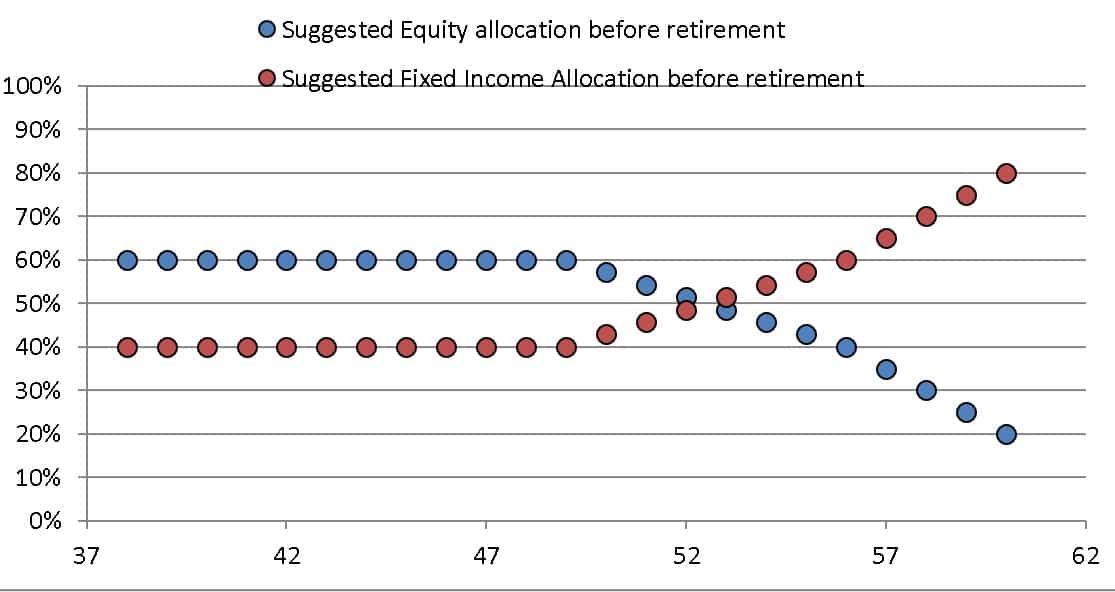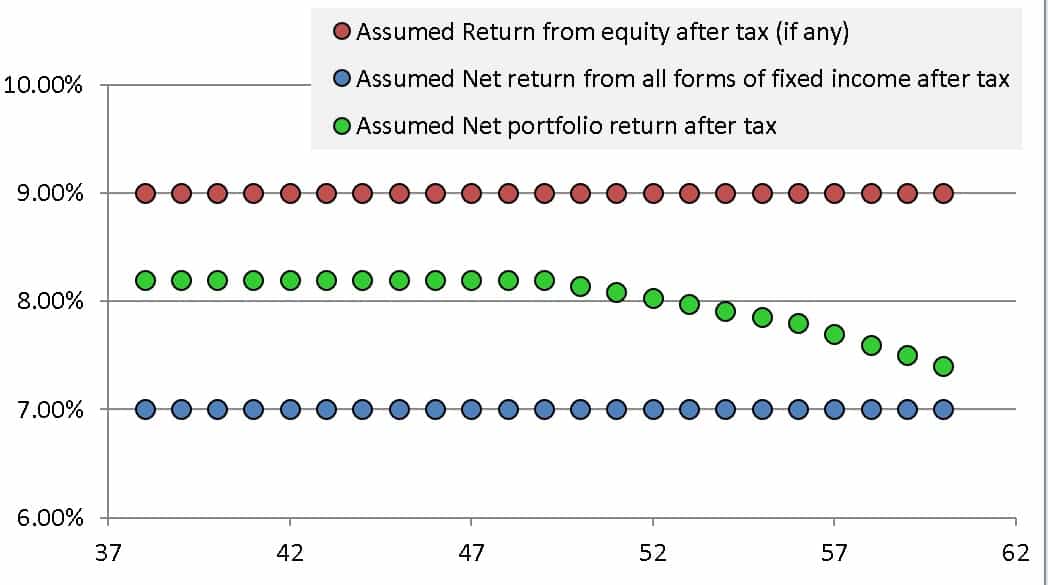Last Updated on February 12, 2022 at 6:13 pm
Here is another interesting question from a reader who wishes anonymity: I have the following question: Should I stop investing in mutual funds? I am a government employee working in academia. My income is stable, and I wish to retire at the normal age of 60.
My current age is 37, and so far, I have accumulated 50 lakh in mutual funds and NPS (almost 50-50%). I ran numbers on different calculators. I agree with Dr Pattu’s suggestions, about approx. 6-7 crore for my retirement. My monthly expenses are around 50K. Currently, I am saving 35K towards retirement and 15 K towards my son’s education. I am considering stopping mutual fund investments for retirement with the following scenario:
1) If I stop contributing to my MF portfolio, within the next 23 years, 50 lakh corpus will replicate thrice, and at retirement, it will be around 4 crores!
2) Being a government servant, I have a mandatory 20 % salary going towards NPS. Using conservative estimates and a 5% annual step-up, in the next 23 years, the NPS corpus will reach close to 2.5 crores! So I will have a total of around 6.5 crores at the age of 60!
Join 32,000+ readers and get free money management solutions delivered to your inbox! Subscribe to get posts via email! (Link takes you to our email sign-up form)
🔥Want to create a complete financial plan? Learn goal-based investing? Exclusive access to our DIY tools? Increase your income with your skills? Enjoy massive discounts on our robo-advisory tool & courses! 🔥
3) Further, I am considering continuing savings towards education, use the remaining amount for A) buying a second home B) international travel per year. Do you think it is a practical option? I will appreciate your recommendation on the same.
Let us first consider the present situation of the person (Mr Q for short). He has about 25 lakhs in mutual funds and 25 lakhs in NPS (I am assuming standard govt asset allocation with a majority in gilts). The monthly expenses are about Rs. 50,000.
Let us find out if there are any red flags in the above assumptions: 50L becoming 4 crores in 23 years is equivalent to an annualized growth rate of 9.5%. Is this realistic? We need to keep asset allocation in mind. It is currently about 50:50. If we assume NPS offers a return of about 7% over the next 23 years (please don’t say I get 10% now – past tense!)
Let us assume equity mutual funds provide a return of about 9% (post-tax) after 23 years (I think this is a bit optimistic but let us roll with it). The 50L portfolio is left without maintenance (rebalancing) or withdrawals (touch wood!).
This would grow to about Rs. 3 crores, a good one crore short. Which is a bit too much. More importantly, unmaintained growth is impractical because out of this Rs. 3 crores, the equity component would be 60%. That is a bit too much (considering no further investments) at age 60. Regular rebalancing or a gradual reduction in equity allocation is likely to lower the corpus further.
The second assumption is that further contributions to NPS would result in a corpus of Rs. 2.5 crores. This depends on the return assumed and the current contribution, and future promotions. The 5% increase in contribution per year is easily possible. For a 7% overall return after 23 years, the current contribution should be about 25K. Only Mr Q can check this feasibility.
In any case, the second approximation seems a lot more reasonable than the first. I do not share his enthusiasm that 50L will become 4 Crores in 23 years without further contributions. I would urge him to continue investing for retirement as usual and draw out an equity reduction plan. This would mean investing more than what he does now!
For example, these are the asset allocation variations with return assumptions given by the robo advisory template for the inputs provided. The key point to note is, the investment amount will change as per this plan.


Better safe than sorry: Mr Q has made some safe assumptions on the inflation rate. Otherwise, the corpus is unlikely to be so high. However, the return assumption must also be reasonable and must consider an asset allocation with gradually decreasing equity. He could make a compromise of sorts by assuming about 7% inflation pre-retirement and 6% post-retirement.
After erring on the side of caution in every assumption possible, one can reduce investments (not stop) if there is no further need to invest for retirement! For the last few years, the temple has been telling me this (no need to invest anymore). I however continue to invest normally and increase my investments each year normally.
For example, my stock portfolio is technically tagged to retirement, but I can dip into it for my other dreams at any time. Therefore I would recommend that we never stop investing for retirement even if we don’t need to. We can always dip into the “extra” portion to fund our dreams or requirements in future.
🔥Enjoy massive discounts on our courses, robo-advisory tool and exclusive investor circle! 🔥& join our community of 7000+ users!
Use our Robo-advisory Tool for a start-to-finish financial plan! ⇐ More than 2,500 investors and advisors use this!
Track your mutual funds and stock investments with this Google Sheet!
We also publish monthly equity mutual funds, debt and hybrid mutual funds, index funds and ETF screeners and momentum, low-volatility stock screeners.





- Do you have a comment about the above article? Reach out to us on Twitter: @freefincal or @pattufreefincal
- Have a question? Subscribe to our newsletter using the form below.
- Hit 'reply' to any email from us! We do not offer personalized investment advice. We can write a detailed article without mentioning your name if you have a generic question.
Join 32,000+ readers and get free money management solutions delivered to your inbox! Subscribe to get posts via email! (Link takes you to our email sign-up form)
About The Author
 Dr M. Pattabiraman(PhD) is the founder, managing editor and primary author of freefincal. He is an associate professor at the Indian Institute of Technology, Madras. He has over ten years of experience publishing news analysis, research and financial product development. Connect with him via Twitter(X), Linkedin, or YouTube. Pattabiraman has co-authored three print books: (1) You can be rich too with goal-based investing (CNBC TV18) for DIY investors. (2) Gamechanger for young earners. (3) Chinchu Gets a Superpower! for kids. He has also written seven other free e-books on various money management topics. He is a patron and co-founder of “Fee-only India,” an organisation promoting unbiased, commission-free investment advice.
Dr M. Pattabiraman(PhD) is the founder, managing editor and primary author of freefincal. He is an associate professor at the Indian Institute of Technology, Madras. He has over ten years of experience publishing news analysis, research and financial product development. Connect with him via Twitter(X), Linkedin, or YouTube. Pattabiraman has co-authored three print books: (1) You can be rich too with goal-based investing (CNBC TV18) for DIY investors. (2) Gamechanger for young earners. (3) Chinchu Gets a Superpower! for kids. He has also written seven other free e-books on various money management topics. He is a patron and co-founder of “Fee-only India,” an organisation promoting unbiased, commission-free investment advice.Our flagship course! Learn to manage your portfolio like a pro to achieve your goals regardless of market conditions! ⇐ More than 3,000 investors and advisors are part of our exclusive community! Get clarity on how to plan for your goals and achieve the necessary corpus no matter the market condition is!! Watch the first lecture for free! One-time payment! No recurring fees! Life-long access to videos! Reduce fear, uncertainty and doubt while investing! Learn how to plan for your goals before and after retirement with confidence.
Our new course! Increase your income by getting people to pay for your skills! ⇐ More than 700 salaried employees, entrepreneurs and financial advisors are part of our exclusive community! Learn how to get people to pay for your skills! Whether you are a professional or small business owner who wants more clients via online visibility or a salaried person wanting a side income or passive income, we will show you how to achieve this by showcasing your skills and building a community that trusts and pays you! (watch 1st lecture for free). One-time payment! No recurring fees! Life-long access to videos!
Our new book for kids: “Chinchu Gets a Superpower!” is now available!


Must-read book even for adults! This is something that every parent should teach their kids right from their young age. The importance of money management and decision making based on their wants and needs. Very nicely written in simple terms. - Arun.Buy the book: Chinchu gets a superpower for your child!
How to profit from content writing: Our new ebook is for those interested in getting side income via content writing. It is available at a 50% discount for Rs. 500 only!
Do you want to check if the market is overvalued or undervalued? Use our market valuation tool (it will work with any index!), or get the Tactical Buy/Sell timing tool!
We publish monthly mutual fund screeners and momentum, low-volatility stock screeners.
About freefincal & its content policy. Freefincal is a News Media Organization dedicated to providing original analysis, reports, reviews and insights on mutual funds, stocks, investing, retirement and personal finance developments. We do so without conflict of interest and bias. Follow us on Google News. Freefincal serves more than three million readers a year (5 million page views) with articles based only on factual information and detailed analysis by its authors. All statements made will be verified with credible and knowledgeable sources before publication. Freefincal does not publish paid articles, promotions, PR, satire or opinions without data. All opinions will be inferences backed by verifiable, reproducible evidence/data. Contact information: To get in touch, use this contact form. (Sponsored posts or paid collaborations will not be entertained.)
Connect with us on social media
- Twitter @freefincal
- Subscribe to our YouTube Videos
- Posts feed via Feedburner.
Our publications
You Can Be Rich Too with Goal-Based Investing
 Published by CNBC TV18, this book is meant to help you ask the right questions and seek the correct answers, and since it comes with nine online calculators, you can also create custom solutions for your lifestyle! Get it now.
Published by CNBC TV18, this book is meant to help you ask the right questions and seek the correct answers, and since it comes with nine online calculators, you can also create custom solutions for your lifestyle! Get it now.Gamechanger: Forget Startups, Join Corporate & Still Live the Rich Life You Want
 This book is meant for young earners to get their basics right from day one! It will also help you travel to exotic places at a low cost! Get it or gift it to a young earner.
This book is meant for young earners to get their basics right from day one! It will also help you travel to exotic places at a low cost! Get it or gift it to a young earner.Your Ultimate Guide to Travel
 This is an in-depth dive into vacation planning, finding cheap flights, budget accommodation, what to do when travelling, and how travelling slowly is better financially and psychologically, with links to the web pages and hand-holding at every step. Get the pdf for Rs 300 (instant download)
This is an in-depth dive into vacation planning, finding cheap flights, budget accommodation, what to do when travelling, and how travelling slowly is better financially and psychologically, with links to the web pages and hand-holding at every step. Get the pdf for Rs 300 (instant download)